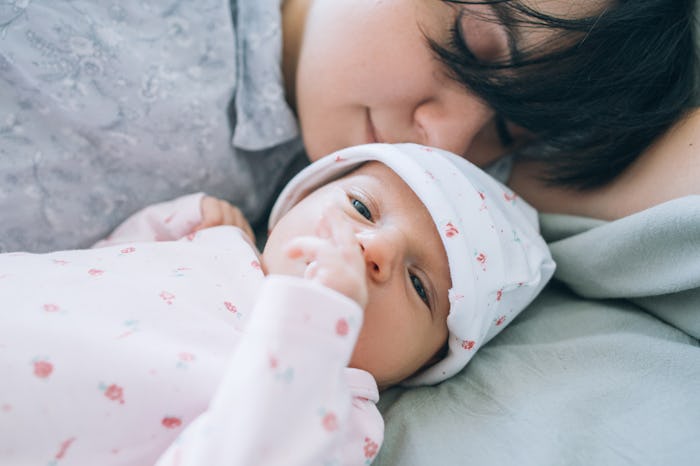Life
Co-Sleeping With Your Baby For Too Long Could Seriously Affect Your Mental Health, Study Says
Despite the many health benefits, such as increased sleep for both the mother and the baby, some parenting experts warn against co-sleeping — and now researchers are also warning that co-sleeping with your baby too long could lead to depression, according to the Ledger-Enquirer.
There's already a wealth of research surrounding the risks of co-sleeping — where a parent (or both parents) sleep in the same bed with their infant. The risks include smothering the baby and the baby falling off the bed, which is why the University of Notre Dame’s Mother-Baby Sleep Laboratory suggests using a co-sleeping attachment or allowing the baby to sleep in the same room, but on a more stable surface than the bed, the Ledger-Enquirer reported. The American Academy of Pediatrics has actually discouraged co-sleeping habits as there could be a possible link to sudden infant death syndrome, as well.
But a new study from Penn State, published in the journal Infant and Child Development, looked at the implications of co-sleeping not for the baby but, rather, for the parent. The researchers analyzed the sleeping habits of 103 mothers in their baby’s first year of life, and they found that parents who co-sleep with their babies for longer than six months reported higher levels of stress, depression and feelings of judgement for their parenting decisions, according to Futurity.
Co-sleeping is relatively common in countries outside the U.S., Douglas Teti, department head and professor of human development and family studies at Penn State said in a press release.
It's known to be common in Asian and South American countries, where many low-income groups "may not have enough rooms or beds in their homes," according to Medical Daily. But it still happens in the U.S., too, by choice. In fact, the study found that 73 percent of families co-slept at the one-month point, but that dropped to about 50 percent by three months and 25 percent by six months.
While one might think that co-sleeping would reduce a mother's stress, since she is with her baby and can be sure that the baby is sleeping well, the mothers who co-slept past six months reported feeling more than 75 percent more depressed than mothers who had moved their babies to another room by that point, and more worried about the quality of their baby’s sleep, according to Futurity.
Perhaps that's because they're not getting as much sleep.
"Co-sleeping needs to work well for everyone, and that includes getting adequate sleep," Teti said in the release. "To be the best parent you can be, you have to take care of yourself, and your child benefits as a result."
If there are two parents involved, both should agree and feel comfortable with the decision to co-sleep.
Teti also said in the press release that it may not be the co-sleeping itself that’s causing parents stress, but rather the feeling among persistent co-sleepers that they’re doing something wrong.
"We definitely saw that the persistent co-sleepers — the moms that were still co-sleeping after six months — were the ones who seemed to get the most criticism," Teti said in the release, adding that their greater levels of worry about their baby's sleep makes sense since they're getting criticized about something that people are saying they shouldn't be doing.
The study supports 2016 research by Penn State that found that mothers who co-slept with their babies longer than six months had more fragmented personal sleep, less marital satisfaction and felt worse about how they were faring as parents, The New York Times reported.
Ultimately, the pros and cons to co-sleeping are both long lists depending on who you ask. But if both parents are comfortable, getting adequate sleep and ensuring the safety of the baby, it's a non-issue. It's just important for mothers be mindful of not only their baby's health, but also their own.
Editor's note: After publication, we discovered this article did not meet our editorial standards. There were portions that did not correctly attribute another source. It has been updated to meet our standards.
